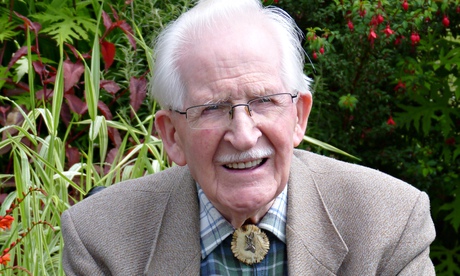
My friend and colleague George Clarke, who has died aged 90, was an organiser for the National Council of Labour Colleges, which dominated the independent working-class education movement from the 1920s to the 60s. The NCLC traced its origins to the strike at Ruskin College, Oxford, of 1909 when students demanding a more radical, Marxist education set up their own organisation.
Born in Deskford, Moray (then in Banffshire), George was the eighth of nine children of Sarah (nee Christie) and John Clarke, a farmer. They lived in a 19th-century farmhouse and had to draw their water from a roadside well. Three of George’s siblings died in infancy and George almost succumbed to pleurisy: he was said to have been saved only by a spoonful of whisky.
He was educated at Deskford school and Buckie high school, but the advent of the second world war put an end to George’s plan to go to Aberdeen University. Instead, he worked as a forester and then joined the RAF, training on Tiger Moths before becoming a flight engineer, flying in Halifax bombers to drop sacks of rice to Indian villagers whose crops had been destroyed to stop them falling into Japanese hands.
Demobbed in 1947, George worked as a tram conductor in Edinburgh and as a surveyor with the Ordnance Survey before, in 1949, starting work for the NCLC organising classes for trade unionists throughout County Durham.
In 1957 the Trades Union Congress took over the NCLC’s course provision and George became administrator of the new training college at Congress House, the TUC’s headquarters in central London. As well as organising courses in Britain, George ran others for trade unions in Belgium, Egypt, Cyprus and the West Indies. George worked at Congress House and at the TUC National Education Centre in Crouch End, north London, until his retirement in 1985.
In 1949 George had married Rachel (Ray) Milligan, and on his retirement they moved to Stirling. George was active in the Labour party and in Stirling Chess Club. He became chess correspondent for the Stirling Observer and in 2002 organised the Scottish chess championships in Stirling, the first held there for 48 years.
Ray died in 1999. In 2009, after being diagnosed with osteoporosis and myeloma, George moved to live with his daughter, Rhona, on the Isle of Mull. He continued his chess activities, sending more than 1,000 “chess teasers” to the Stirling Observer, raised substantial amounts for the Labour party and even, from Mull, canvassed by phone for Stirling candidates during elections.
George is survived by Rhona, four grandchildren and 12 great-grandchildren.







